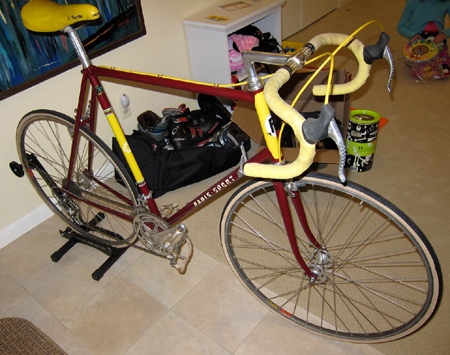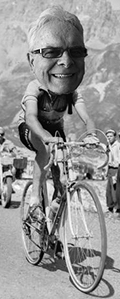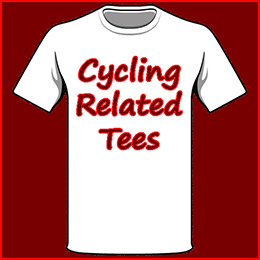Rack eyelets on a race bike?
 Tue, March 8, 2011
Tue, March 8, 2011  I was recently sent pictures of a Paris Sport bike that I built in 1979. The new owner Andy Katz was given the bike by his uncle who was the original owner.
I was recently sent pictures of a Paris Sport bike that I built in 1979. The new owner Andy Katz was given the bike by his uncle who was the original owner.
Andy asked me, “What are these eyelets for? I can’t imagine rack eyelets on a race oriented bike like this.”
Indeed, hard to imagine today, but not back in the late 1970s when this bike was built, and I can assure Andy that these eyelets would not have been added by me, had they not been requested by the customer.
When the cycling boom hit the USA in the 1970s, it was immensely popular to load up a bike with front and rear pannier bags and go “Trekking” across the country. I am pretty sure this is where the Trek Bicycle Company got its name, as it was founded during this period.
Also at this time, Jim Blackburn founded a company that bears his name today. He made aluminum racks and pannier bags for bikes. It was not unusual to have brazed-on fittings on a bike frame to accommodate these racks.
 This was an American thing, alien to me coming from Europe where if you built frames as I did, they were either racing frames, built for that purpose, or a touring bike with rack fittings.
This was an American thing, alien to me coming from Europe where if you built frames as I did, they were either racing frames, built for that purpose, or a touring bike with rack fittings.
The eyelets on the old style "Long" Campagnolo rear drop-outs, (Right.) were actually fender/mudguard eyelets that were often left on a race bike so mudguards could be fitted for winter training.
When I first came to America I rode in a few races, it was quite common to see guys riding a criterium race with a Blackburn rack still attached.
They couldn’t be bothered to take the rack off for the race, because at that time when training, even on relatively short rides, it seemed necessary to take your entire tool kit with you, even spare parts, and a change of clothing.
It wasn’t until the 1980s that American cyclists finally realized that you didn’t need to carry all this stuff with you on a single day ride, and the trend became as it is today, to have maybe a small bag under your saddle, and the rest goes in your pockets.

My advice to Andy with regards to his Paris Sport with the eyelets. Leave them be, they are a conversation piece, and period correct.
On another point, this Paris Sport frame is unusual in that it has my four “m” logo on the seat tube, Mike Fraysse who painted the frames did not usually do this. I was employed by his company, they were Paris Sport frames, not ‘dave moulton’ frames. However, if the customer whined enough insisted, Mike would compromise and add my logo.
The original owner of this bike moved to Florida, where the bike ended up in storage for many years. Interestingly, Andy Katz, the new owner lives within ten miles of Ridgeville Park, New Jersey where this frame was built in the Paris Sport shop.
It has come home, so to speak.























Reader Comments (18)
Interesting!
Another good use for these eyelets - license plate holders, for when we are forced to register and license our bikes!
What about the brake cable routing :P
I realize they should be behind the bars. Not to worry, I'm switching to Aero levers!
I did notice but it was not relavant to the article. Plus I was being diplomatic.
Dave
Funny thing is when I got the bike, it came with the bars off, but with cables still attached. I must have twisted the damed things around, and couldn't figure out how to get the cables situated the right way. I spent half an hour messing with it, when I realized all I had to do was detatch the cables from the levers! Duh!
Just pulling your leg. Its a great looking bike, I really like the color scheme.
I just read a couple paragraphs by Mike Fabian concerning Paris Sport and was captivated by a quote:
" It was all part of an intelligent well-run bike club scene where a new rider could rub elbows with experienced riders/racers and "learn the ropes" of the arcane, dangerous, and little-known world of bike racing at the time. "
Dangerous?
Tim Joe,
What I take that quote to mean is to an outsider coming into the “Little known” sport of cycle racing at that time, it would appear dangerous.
Dave
The color scheme is growing on me. I now think it's kinda ugly, as opposed to horrific!
There was more to the bike boom than just trekking across the continent. Most of these bikes would have been used by people who just had to carry things, such as a college student might. The light racks people installed using those eyelets weren't meant for touring bags as much as they were for briefcases and such. This was at a time when out-and-out touring bikes were expensive propositions, and so cheap racing type bikes were what most people had. It was either that or a heavy English "racer" 3-speed. I'm sure some people wanted to pay more for a real racing bike, as opposed to the cheaper racing-like 10-speeds... but had a similar need to be able to attach a rear rack.
When I had my current lugged steel frame made in 1998, I had no hesitation whatsoever in asking for rack eyelets. I like a spirited ride, but sometimes I need to carry something on it. The bike will never be raced, so why not? Even if it was raced, eyelets wouldn't matter much.
Dave I saw that on BF.com and knew it would come home. I never realized guys would race with racks though, that's funny as hell .
My bike shop tour of duty was in the early '80s, '81 - '84 or so. In Northern New Jersey - small world. Whippany Cycle, located strangely enough, in Whippany, New Jersey.
Back then, most manufactures offered touring models, complete with rack and fenders mounts. I doubt many that we sold ever saw actual touring action, but they did make good all-around bikes. Those bikes would probably still be a better choice for many cyclists today, compared to the usual carbon race rep. That's a debate for another time.
That old Paris Sport is cool bike. Enjoy it.
In defference to the old racers I'm leaving my rear blinky light and mirror on my visor when I'm in a race next weekend. The mirror I'll use to try and keep ahead of the sweep vehicle...
Thanks Dan. Sounds like you were working at Whippany Cycle when I was 16 or so, living at home in Brooklyn and worshipping the clamp on Campy NR shifters Ibought for my first real bike - a Peugeot U something or other! I remember sawing off the suicide shifter cable guides on the down tube to install the clamp on shifters. Fun times.
Interesting. Due to finances, or annoyed spouses, most of us cannot have a bike for every purpose, so have to improvise. Modern road bikes are terrible for this, with their tight geometry and lack of tire clearance; however, this is the bike many buy, for lack of knowledge. Just as I did. There is another way: using frame, saddle and handlebar bags. Bikepacking.net has a lot of information on this, though mostly for off-road. This has been the inspiration for making do with my bike.
www.bikepacking.net
www.thecyclistsite.com/adventure/2009/8/18/bikepacking-the-series-begins.html
http://hanlonsrzr.blogspot.com/2011/02/club-racer-to-randonneurcredit-card.html
http://hanlonsrzr.blogspot.com/2011/01/choosing-road-randonneur-or-touring.html
As a follow up, as I begin trying to clean up the frame and get it in riding shape, I notice that the Paris Sport decals are basically shot and peeling off. Should I remove them? Get a duplicate fresh set from somewhere?
I'd love to have the entire frame re-painted - as there is plenty of paint damage and rust, except I would lose the Moulton "M" logo.
What to do?
UPDATE: Look what my uncle sent me - he found his duplicate set of decals that he ordered in the early 80's but never got around to using. Now I can get the frame restored, and keep the Paris Sport name alive.
http://i42.photobucket.com/albums/e324/agk972/IMG_0590.jpg
Dave - You don't have any of your Moulton cross decals lying around anywhere do you??
Andy,
Email me re the decal davesbikeblog@gmail.com
Dave